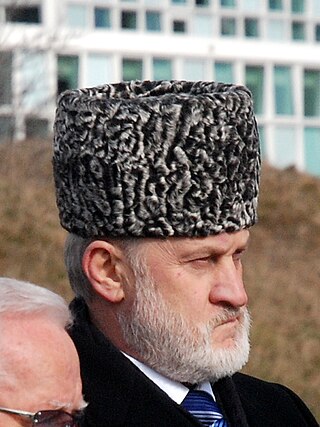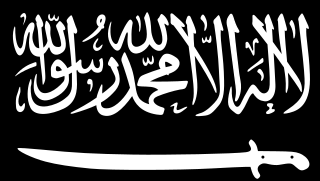Related Research Articles

Chechnya, officially the Chechen Republic, is a republic of Russia. It is situated in the North Caucasus of Eastern Europe, between the Caspian Sea and Black Sea. The republic forms a part of the North Caucasian Federal District, and shares land borders with the country of Georgia to its south; with the Russian republics of Dagestan, Ingushetia, and North Ossetia-Alania to its east, north, and west; and with Stavropol Krai to its northwest.

Akhmed Halidovich Zakayev is a Chechen statesman, political and military figure of the unrecognised Chechen Republic of Ichkeria (ChRI). Having previously been a Deputy Prime Minister, he now serves as Prime Minister of the ChRI government-in-exile. He was also the Foreign Minister of the Ichkerian government, appointed by Aslan Maskhadov shortly after his 1997 election, and again in 2006 by Abdul Halim Sadulayev. An active participant in the Russian-Chechen wars, Zakayev took part in the battles for Grozny and the defense of Goyskoye, along with other military operations, as well as in high-level negotiations with the Russian side.

The Second Chechen War took place in Chechnya and the border regions of the North Caucasus between the Russian Federation and the breakaway Chechen Republic of Ichkeria, from August 1999 to April 2009.

Ali Musaevich Taziev, also known as Akhmed Yevloev, Magomet Yevloyev, and Emir Magas; born 19 August 1974) is the former leader of both the Ingushetia-based Ingush Jamaat and as the military wing of the Caucasus Emirate. On 30 September 2006, Taziev was appointed to the post of commander of the Caucasian Front by the orders of Dokka Umarov. In July 2007, one year after Shamil Basayev’s death, Taziev became his official successor as the most high-ranking military commander in the rebel forces. He is believed to be personally responsible for the death of several local high-ranking security officials.

Abdul-Halim Abusalamovich Sadulayev was the fourth President of the Chechen Republic of Ichkeria. Sadulayev served little more than a full year as President before being killed in a gun battle with FSB and pro-Russian Chechen forces.

The president of Ichkeria, formally the president of the Chechen Republic of Ichkeria was the head of the Chechen Republic of Ichkeria from 1991 to 2007, the Islamic Republic that existed until the victory of the Russian Federation in the Second Chechen War.

The Chechen Republic of Ichkeria, known simply as Ichkeria, and also known as Chechnya, was a de facto state that controlled most of the former Checheno-Ingush ASSR.

Doku Khamatovich Umarov, also known as Dokka Umarov as well as by his Arabized name of Dokka Abu Umar, was a Chechen mujahid in North Caucasus. Umarov was a major military figure in both wars in Chechnya during the 1990s and 2000s, before becoming the leader of the greater insurgency in the North Caucasus. He was active mostly in south-western Chechnya, near and across the borders with Ingushetia and Georgia.
Movladi Saidarbievich Udugov is the former First Deputy Prime Minister of the Chechen Republic of Ichkeria (ChRI). As a Chechen propaganda chief, he was credited for the Chechens' victory on the information front during the First Chechen War.
In June 2000, the North Caucasian Chechen separatist-led Chechen insurgents added suicide bombing to their tactics in their struggle against Russia. Since then, there have been dozens of suicide attacks within and outside the republic of Chechnya, resulting in thousands of casualties among Russian security personnel and civilians. The profiles of the suicide bombers have varied, as have the circumstances surrounding the bombings.

Melfi Al Hussaini Al Harbi, more commonly known as Muhannad, and also known as Abu Anas, was a Mujahid Emir (commander) fighting in Chechnya. Following the death of Abu Hafs al-Urduni on 26 November 2006, he was named leader of the battalion of foreign fighters once commanded by the notorious Saudi-born Ibn al-Khattab.

The Caucasus Emirate, also known as the Caucasian Emirate, Emirate of Caucasus, or Islamic Emirate of the Caucasus, was a jihadist organisation active in rebel-held parts of Syria and previously in the North Caucasus region of Russia. Its intention was to expel the Russian presence from the North Caucasus and to establish an independent Islamic emirate in the region. The Caucasus Emirate also referred to the state that the group sought to establish. The creation of Caucasus Emirate was announced on 7 October 2007, by Chechen warlord Dokka Umarov, who became its first self-declared "emir".
Aslambek Ilimsultanovich Vadalov, also known by his nom de guerre Emir Aslambek, is a Chechen rebel leader fighting in the North Caucasus. He was appointed the supreme leader of the Caucasus Emirate on 1 August 2010, though this was later retracted.
Khuseyn Vakhaevich Gakayev, also known as Emir Mansur and Emir Hussein, was a mujahid Emir (commander) fighting in Chechnya. He was one of the most senior field commanders still operating in the North Caucasus prior to his death on 24 January 2013.
The 2010 Tsentoroy Attack was an insurgent operation carried out on the morning of 29 August 2010 by Chechen rebels in Tsentoroy, Chechnya, the home village and stronghold of pro-Moscow Chechen President Ramzan Kadyrov. The assault - which represented the largest and most audacious attack launched in the republic for over a year - is considered to have "shattered" the image of Kadyrov's unshakeable rule in Chechnya, as it was the first time in six years that his seemingly impregnable village had come under attack.

The Lopota incident, known in Georgia as the special operation against an illegal armed group in Lopota, was an armed incident where the Georgian special forces engaged an unknown paramilitary group of about 17 unknown individuals which had allegedly taken several people hostage in the remote Caucasus gorge of Lopota near the border between Georgia and the Russia's Republic of Dagestan.

The Province of Nokhchicho was the Chechen-based wing of the Caucasus Emirate organisation. It was created in 2007 as one of the Emirate's six vilayats, replacing the Chechen Republic of Ichkeria.
Rustam Magomedovich Azhiev is deputy commander-in-chief of the Chechen battalion OBON fighting on the Ukrainian side in the Russo-Ukrainian war. Azhiev is a veteran of the Second Russo-Chechen war and fought on the side of the opposition in the Syrian civil war. In the latter he was the leader of the rebel group Ajnad al-Kavkaz.
References
- 1 2 3 "Death Toll In Grozny Parliament Attack May Have Been Far Higher". RFE/RL, 29 October 2010.
- ↑ Abdullaev, Nabi. "A Parliament Built for Kadyrov". The Moscow Times , 25 November 2005.
- ↑ Page, Jeremy. "Chechens too scared to vote in 'sham' poll". The Times , 26 November 2005.
- ↑ Goble, Paul. "Window on Eurasia: Kadyrov has Made Chechnya a Totalitarian State, Human Rights Group Says". 16 January 2008.
- 1 2 Правозащитники: Тоталитарный режим в Чеченской республике вмешивается во все аспекты жизни людей. sobkorr.ru, 15 January 2008. (in Russian)
- ↑ Gligashvili, Sergei. "The choice of unfreedom". Prague Watchdog, 25 May 2009.
- ↑ Ferris-Rotman, Amie. "Factbox: Five facts on Chechen leader Ramzan Kadyrov". Reuters, 5 March 2011.
- ↑ Worst of the Worst: The World’s Most Repressive Societies 2009 Archived 10 November 2011 at the Wayback Machine . Freedom House
- ↑ Nowak, David. "Activist on trial for slandering Chechen leader" [ permanent dead link ]. Los Angeles Daily News, 3 February 2011.
- ↑ Washington, Tom. "United Russia could win 120% of seats in Chechen parliament" Archived 9 March 2012 at the Wayback Machine . The Moscow News, 27 October 2010.
- 1 2 3 4 "Chechnya parliament attackers 'arrived by taxi'", BBC News, 20 October 2010.
- ↑ "Chechen Commanders Rebel Against Umarov", RFE/RL, 13 August 2010.
- ↑ "Chechen Rebel Field Commanders Renounced Loyalty Oath to Doku Umarov" Archived 16 October 2012 at the Wayback Machine . Eurasia Daily Monitor, Volume 7, Issue 182. Jamestown Foundation, 8 October 2010.
- 1 2 3 4 5 Чеченские боевики прошли в парламент, Kommersant , 20 October 2010. (in Russian)
- 1 2 3 Стрельба в Грозном (in Russian). Interfax. 19 October 2010.
- ↑ "Islamists Stage Suicide Attack on Chechen Parliament". The Moscow Times . 19 October 2010.
- 1 2 "Attack on Chechen parliament in Grozny leaves six dead". BBC News. 19 October 2010.
- 1 2 3 4 Ibragimov, Muslim (20 October 2010). "Zakayev denies his involvement in organizing the attack on the parliament of Chechnya". Caucasian Knot. Archived from the original on 28 July 2011. Retrieved 21 October 2010.
- ↑ Ibragimov, Muslim (19 October 2010). "Russia's GPO puts Ahmed Zakaev on international wanted list again". Caucasian Knot. Archived from the original on 28 July 2011. Retrieved 21 October 2010.
- ↑ Washington, Tom. "Kadyrov blames London for Grozny attack" Archived 16 July 2011 at the Wayback Machine . The Moscow News, 20 October 2010.
- ↑ "Statement by the Minister for Foreign Affairs of the Chechen Republic of Ichkeria" Archived 28 July 2011 at the Wayback Machine . Chechenpress, 31 October 2007.
- ↑ "Foreign Minister Of Chechen Separatist Government Resigns". RFE/RL, 20 November 2007.
- ↑ Fuller, Liz. Russia: "Is North Caucasus Resistance Still Serious Threat?" Archived 25 August 2015 at the Wayback Machine , RFE/RL, 1 November 2007.
- ↑ "Former Foreign Minister of C.R.I. Zakayev reminded of himself sharing plans of FSB". Department of Monitoring, Kavkaz Center. 26 October 2009. Retrieved 19 October 2010.
- ↑ "EU Condemns Terrorist Attacks on Chechen Parliament". CRIENGLISH.com, 20 October 2010. Retrieved 25 November 2010.
- ↑ "PACE President reacts to attack on Chechen Parliament". PACE website, 20 October 2010.
- ↑ "Moscow's Caucasus failure exposed in Chechnya attack". Hurriyet, 19 October 2010.
- ↑ At least four killed in suicide attack on Chechen parliament. Nationalpost.com. Retrieved on 25 November 2010.
- ↑ "Deaths in Chechen parliament attack". Al Jazeera English, 19 October 2010. Retrieved 25 November 2010.